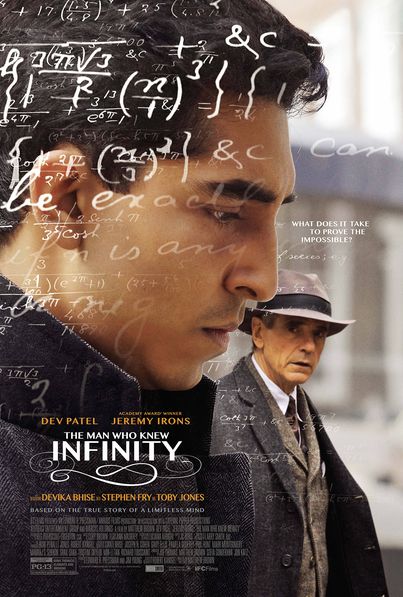The Man Who Knew Infinity (2015)

The Man Who Knew Infinity is a poignant biographical drama released in 2015 that chronicles the life of the brilliant Indian mathematician Srinivasa Ramanujan. Directed by Matt Brown, this film offers a compelling exploration of genius, cultural clash, and the pursuit of knowledge, set against the backdrop of early 20th-century academia.
The narrative centers around Ramanujan, played by Dev Patel, who leaves his humble beginnings in Madras to pursue his passion for mathematics at Cambridge University. Despite his extraordinary talent, Ramanujan faces significant challenges, including racial prejudice and skepticism from the academic elite. The film portrays his journey as he seeks recognition and validation for his groundbreaking theories, particularly in the field of number theory.

Central to the story is the relationship between Ramanujan and his mentor, G.H. Hardy, portrayed by Jeremy Irons. Hardy, a prominent mathematician at Cambridge, initially doubts Ramanujan’s unconventional methods and the validity of his work. However, as he witnesses Ramanujan’s brilliance and dedication, a profound bond forms between the two men. Their partnership becomes a focal point of the film, highlighting the transformative power of mentorship and collaboration in the pursuit of intellectual achievement.

The film does an excellent job of contrasting the cultural differences between Ramanujan and the British academic environment. Ramanujan’s deep spiritual beliefs and intuitive approach to mathematics challenge the rigid, formal methods favored by his peers. This cultural clash not only serves as a narrative device but also emphasizes the importance of diverse perspectives in advancing knowledge. The film invites viewers to reflect on the broader implications of inclusivity and acceptance within the academic community.

In addition to its narrative depth, The Man Who Knew Infinity is visually striking. The cinematography captures the contrasting worlds of India and England, from the vibrant streets of Madras to the austere halls of Cambridge. The film’s production design effectively immerses viewers in the early 1900s, bringing to life the settings that shaped Ramanujan’s experiences.

The performances in the film are noteworthy, with Dev Patel delivering a heartfelt portrayal of Ramanujan’s struggles and triumphs. His ability to convey the character’s vulnerability and determination adds emotional weight to the narrative. Jeremy Irons, as Hardy, embodies the complexities of a man grappling with his own insecurities while recognizing the brilliance of his protégé. The chemistry between Patel and Irons brings depth to their relationship, capturing both the tensions and the mutual respect that develop over time.
The Man Who Knew Infinity explores themes of perseverance and the relentless pursuit of knowledge. Ramanujan’s journey serves as an inspiring reminder of the importance of following one’s passions, even in the face of adversity. The film also highlights the often-overlooked contributions of non-Western scholars to the field of mathematics, shedding light on Ramanujan’s significant legacy and his impact on future generations of mathematicians.
Upon its release, the film received positive reviews for its thoughtful storytelling, strong performances, and its ability to make complex mathematical concepts accessible to a broader audience. Critics praised the film for its respectful portrayal of Ramanujan’s life and work, as well as its exploration of the personal and professional challenges he faced.
In conclusion, The Man Who Knew Infinity is a powerful tribute to the life of Srinivasa Ramanujan, celebrating the beauty of mathematics and the resilience of the human spirit. Through its compelling narrative and rich character development, the film not only honors Ramanujan’s legacy but also encourages viewers to appreciate the diverse contributions to the world of knowledge. It stands as a testament to the transformative power of education, friendship, and the pursuit of dreams, inspiring audiences to recognize the value of intellect and creativity in all its forms.











